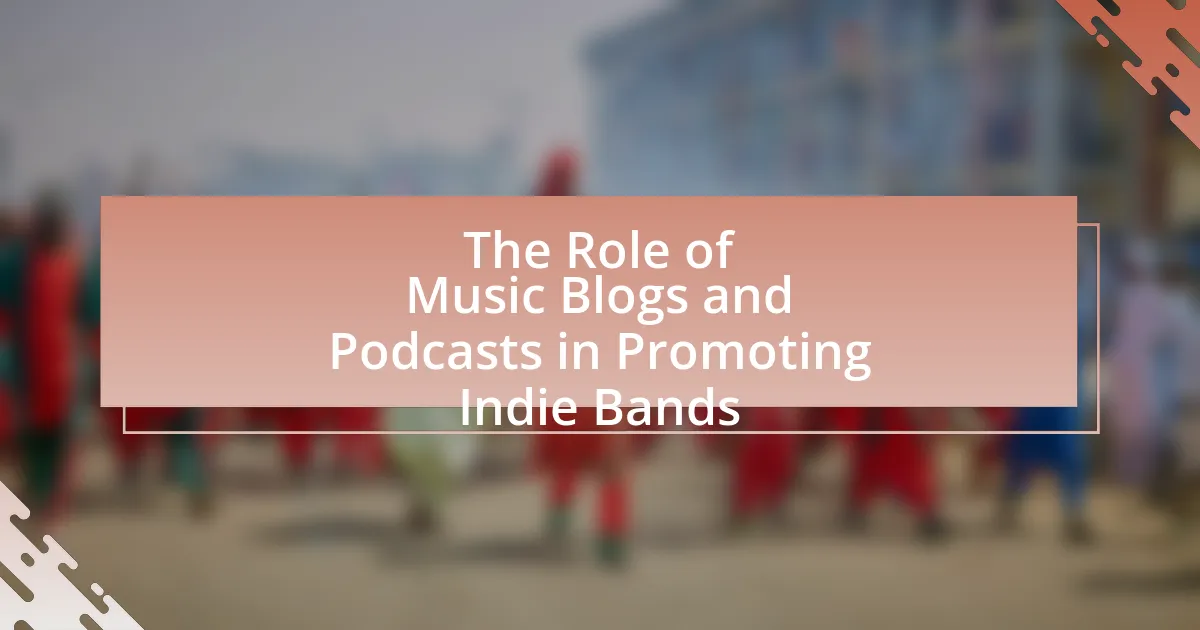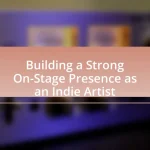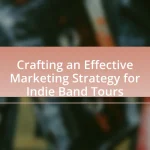Music blogs and podcasts are essential platforms for promoting indie bands, providing critical exposure and audience engagement opportunities. These digital mediums enhance visibility through reviews, interviews, and curated playlists, significantly impacting music discovery, as evidenced by studies indicating that a large percentage of listeners find new artists through these channels. The article explores how music blogs and podcasts contribute to the visibility of indie bands, the types of content they feature, and the strategies indie bands can employ to leverage these platforms effectively. Additionally, it discusses the challenges faced by indie bands without this support and the future trends in music promotion through blogs and podcasts.
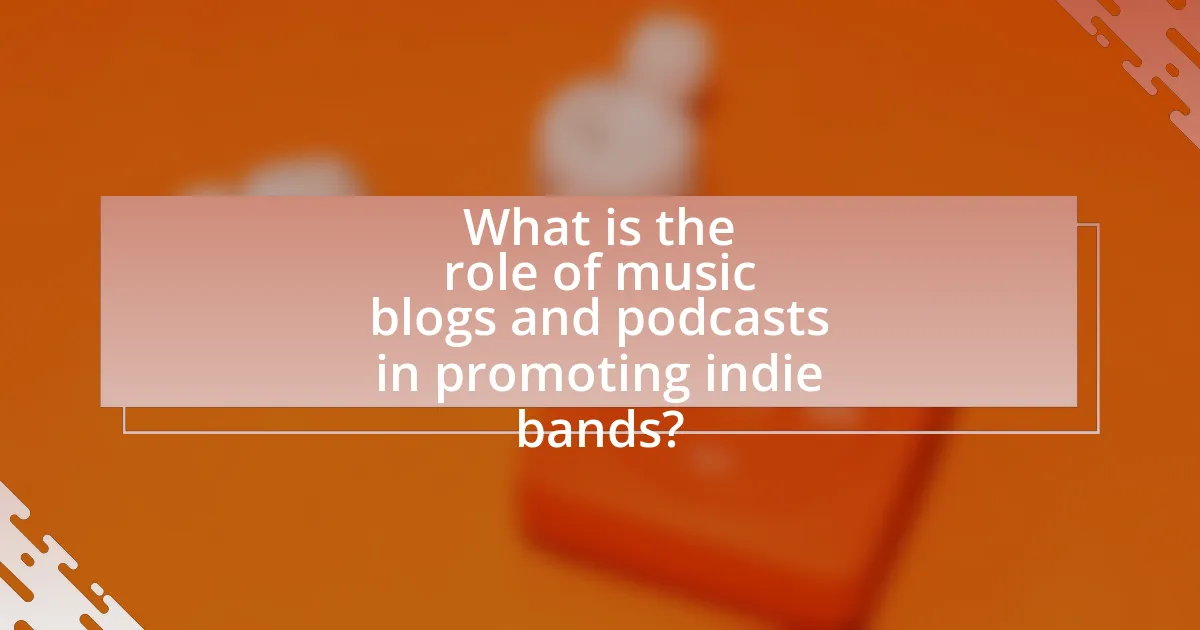
What is the role of music blogs and podcasts in promoting indie bands?
Music blogs and podcasts play a crucial role in promoting indie bands by providing platforms for exposure and audience engagement. These digital mediums allow indie bands to reach wider audiences through reviews, interviews, and curated playlists, which can significantly enhance their visibility. For instance, a study by the University of Southern California found that 70% of music discovery occurs through online platforms, highlighting the importance of blogs and podcasts in shaping listener preferences. Additionally, music blogs often feature exclusive content, such as live sessions or behind-the-scenes interviews, which can create a deeper connection between the band and potential fans. This engagement is essential for indie bands, as they typically lack the marketing budgets of major labels, making organic promotion through these channels vital for their growth and success.
How do music blogs contribute to the visibility of indie bands?
Music blogs significantly enhance the visibility of indie bands by providing a platform for exposure and audience engagement. These blogs often feature reviews, interviews, and curated playlists that spotlight emerging artists, allowing indie bands to reach wider audiences who may not discover them through traditional media channels. For instance, a study by the University of Southern California found that 70% of music blog readers actively seek new music, indicating that blogs serve as a critical discovery tool for indie bands. Additionally, music blogs often have established social media followings, which can amplify the reach of their content, further increasing the chances of indie bands gaining traction in the competitive music landscape.
What types of content do music blogs typically feature about indie bands?
Music blogs typically feature reviews, interviews, and news articles about indie bands. Reviews provide critical assessments of new music releases, helping listeners discover new sounds. Interviews offer insights into the band’s creative process and personal stories, fostering a connection with fans. News articles cover events, tours, and other relevant updates, keeping audiences informed about the band’s activities. These types of content collectively enhance the visibility and reach of indie bands in the music industry.
How do music blogs engage with their audience to promote indie bands?
Music blogs engage with their audience to promote indie bands primarily through content creation, social media interaction, and community building. By publishing reviews, interviews, and features about indie bands, music blogs provide valuable exposure that helps these artists reach new listeners. Additionally, blogs often utilize social media platforms to share their content, encouraging audience interaction through comments and shares, which amplifies the reach of the featured bands. Furthermore, many music blogs foster a sense of community by hosting events, contests, or discussions that involve their audience, thereby creating a loyal following that supports indie music. This multi-faceted approach not only promotes the bands but also strengthens the blog’s relationship with its audience, leading to increased engagement and visibility for the indie music scene.
What impact do podcasts have on the promotion of indie bands?
Podcasts significantly enhance the promotion of indie bands by providing a platform for exposure and audience engagement. They allow indie bands to reach niche audiences through targeted content, often leading to increased fan bases. For instance, a study by the Pew Research Center found that 41% of Americans aged 12 and older have listened to a podcast, indicating a substantial potential audience for indie music. Additionally, podcasts often feature interviews, live performances, and discussions about the bands, which can create a deeper connection between the artists and listeners. This engagement can translate into increased streaming numbers and concert attendance, as evidenced by the rise in popularity of bands featured on popular music podcasts.
How do podcasts create a platform for indie bands to share their stories?
Podcasts create a platform for indie bands to share their stories by providing a dedicated audio space where artists can discuss their music, influences, and personal journeys. This format allows bands to connect with audiences on a deeper level, fostering a sense of intimacy and authenticity that traditional media often lacks. For instance, podcasts like “Song Exploder” invite musicians to break down their songs, offering insights into their creative processes, which can enhance listener engagement and appreciation. Additionally, the accessibility of podcasts enables indie bands to reach diverse audiences without the barriers of traditional music promotion, as they can be featured in niche shows that cater specifically to music enthusiasts.
What are the advantages of using podcasts for indie band promotion compared to traditional media?
Podcasts offer indie bands a unique promotional advantage over traditional media by providing a direct and intimate connection with audiences. This format allows bands to share their stories, music, and insights in a conversational manner, fostering a deeper emotional engagement with listeners. Unlike traditional media, which often relies on brief soundbites or limited airtime, podcasts can accommodate longer discussions, enabling bands to showcase their personalities and creative processes.
Additionally, podcasts have a lower barrier to entry and can reach niche audiences effectively. According to Edison Research, 55% of the U.S. population has listened to a podcast, indicating a growing audience that indie bands can tap into without the high costs associated with traditional advertising. This accessibility allows bands to target specific demographics and build a loyal fan base more efficiently. Furthermore, podcasts often encourage listener interaction through social media and community engagement, enhancing the promotional impact compared to one-way communication typical of traditional media.
Why are music blogs and podcasts essential for indie bands?
Music blogs and podcasts are essential for indie bands because they provide critical exposure and a platform for audience engagement. These media outlets often have dedicated followings that trust their recommendations, allowing indie bands to reach potential fans who may not discover them through traditional channels. For instance, a study by the University of Southern California found that 70% of music listeners discover new artists through blogs and podcasts, highlighting their influence in the music discovery process. Additionally, music blogs and podcasts often feature interviews, reviews, and live sessions, which can enhance an indie band’s credibility and visibility in a competitive market.
What challenges do indie bands face without the support of music blogs and podcasts?
Indie bands face significant challenges without the support of music blogs and podcasts, primarily in visibility and audience reach. Without these platforms, indie bands struggle to gain exposure, as music blogs and podcasts often serve as critical channels for discovering new music. For instance, a study by the University of Southern California found that 70% of music discovery occurs through online platforms, highlighting the importance of blogs and podcasts in promoting lesser-known artists. Additionally, indie bands may find it difficult to build a fanbase and engage with listeners, as these platforms provide essential content that fosters community and connection. Consequently, the absence of music blogs and podcasts can severely limit an indie band’s growth and success in a competitive music industry.
How do music blogs and podcasts help in building a fanbase for indie bands?
Music blogs and podcasts significantly aid in building a fanbase for indie bands by providing platforms for exposure and engagement. These mediums allow indie bands to reach wider audiences through reviews, interviews, and features, which can lead to increased visibility. For instance, a study by the University of Southern California found that 70% of music listeners discover new artists through blogs and podcasts, highlighting their effectiveness in promoting lesser-known musicians. Additionally, music blogs often curate playlists that include indie tracks, further facilitating listener discovery and fostering a community around the band.
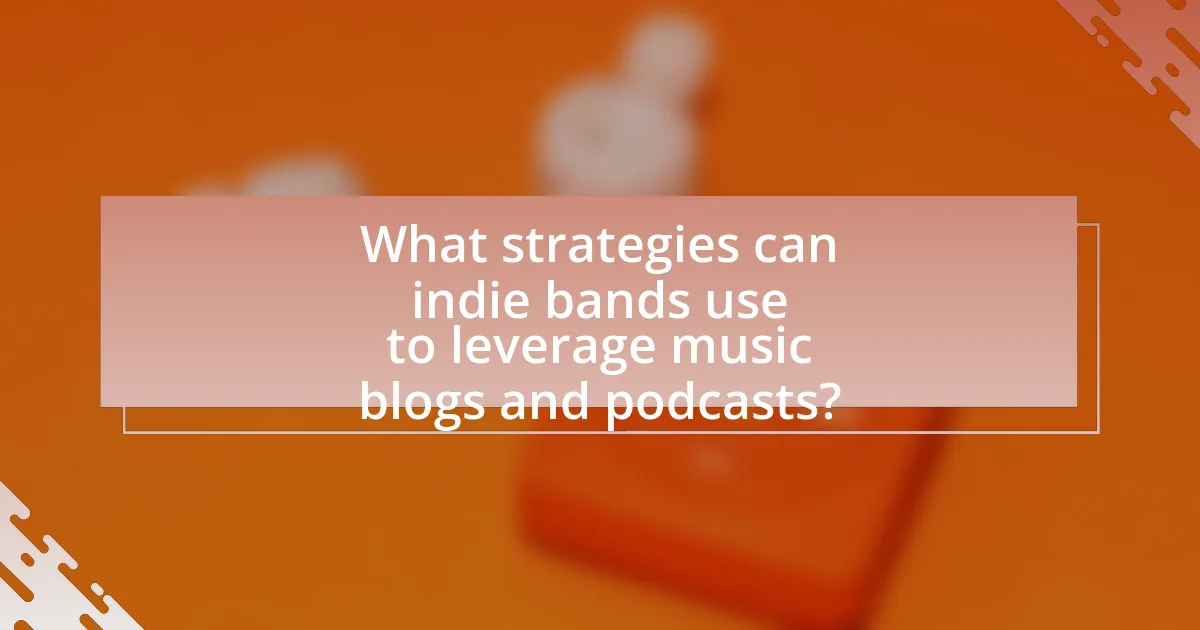
What strategies can indie bands use to leverage music blogs and podcasts?
Indie bands can leverage music blogs and podcasts by actively engaging with these platforms through targeted outreach and content creation. By researching and identifying blogs and podcasts that align with their genre, indie bands can tailor their pitches to highlight unique aspects of their music, increasing the likelihood of coverage. Additionally, providing exclusive content, such as interviews or behind-the-scenes stories, can entice bloggers and podcasters to feature them.
For instance, a study by the Music Industry Research Association found that 70% of music discovery occurs through blogs and podcasts, emphasizing their importance in reaching new audiences. Furthermore, collaborating with influencers in these spaces can amplify their reach, as 49% of consumers rely on recommendations from influencers when making music choices.
How can indie bands effectively reach out to music bloggers?
Indie bands can effectively reach out to music bloggers by crafting personalized and concise emails that highlight their unique sound and recent achievements. Personalization demonstrates genuine interest in the blogger’s work, while a clear and engaging subject line increases the likelihood of the email being opened. Including links to high-quality music, such as streaming platforms or music videos, allows bloggers to easily access the band’s material. Additionally, providing a brief bio and relevant press coverage can establish credibility and context. According to a study by the Music Industry Research Association, personalized outreach increases response rates by up to 50%, underscoring the importance of tailored communication in the music industry.
What elements should be included in a pitch to music blogs?
A pitch to music blogs should include a compelling subject line, a brief introduction of the artist, a description of the music, links to audio or video content, and relevant press materials. The subject line captures attention, while the introduction provides context about the artist’s background and genre. The music description should highlight unique aspects and influences, and links to audio or video allow bloggers to easily access the content. Press materials, such as high-quality images and previous coverage, lend credibility and provide additional context. These elements collectively enhance the likelihood of the pitch being considered by music blogs.
How can indie bands build relationships with music bloggers over time?
Indie bands can build relationships with music bloggers over time by consistently engaging with them through personalized communication and sharing quality content. By reaching out with tailored messages that reflect an understanding of the blogger’s work, bands can establish a connection that goes beyond generic pitches. Additionally, providing exclusive content, such as early access to new music or behind-the-scenes insights, can foster a sense of partnership.
Research indicates that 70% of bloggers prefer personalized outreach over mass emails, highlighting the importance of targeted communication. Furthermore, maintaining regular interaction through social media and commenting on blog posts can keep the relationship active and demonstrate genuine interest. This ongoing engagement helps indie bands remain top-of-mind for bloggers when they seek new content to feature.
What are the best practices for indie bands to engage with podcast hosts?
Indie bands should personalize their outreach to podcast hosts by researching the podcast’s content and audience. This approach ensures that the band’s music aligns with the podcast’s theme, increasing the likelihood of a positive response. Additionally, indie bands should craft a compelling pitch that highlights their unique story, recent achievements, and how their music can add value to the podcast. Engaging with the podcast on social media before reaching out can also create familiarity and demonstrate genuine interest. According to a study by the Podcast Host, personalized pitches have a 50% higher response rate compared to generic ones, reinforcing the effectiveness of tailored communication.
How can indie bands prepare for a podcast interview to maximize exposure?
Indie bands can prepare for a podcast interview to maximize exposure by researching the podcast’s audience and tailoring their message accordingly. Understanding the demographics and interests of the listeners allows bands to connect more effectively, increasing the likelihood of engagement. Additionally, bands should prepare key talking points that highlight their unique sound, recent projects, and any upcoming events, ensuring they communicate their brand clearly.
Practicing responses to common interview questions can enhance confidence and delivery, making the conversation more engaging. Furthermore, promoting the podcast episode through their own social media channels and mailing lists can drive traffic and increase visibility. According to a study by the Podcast Host, 75% of podcast listeners are more likely to support brands and artists featured on their favorite shows, demonstrating the potential for increased exposure through strategic preparation and promotion.
What follow-up strategies should indie bands employ after appearing on a podcast?
Indie bands should employ several follow-up strategies after appearing on a podcast, including engaging with the podcast’s audience on social media, sharing the episode across their platforms, and reaching out to the podcast host for potential future collaborations. Engaging with the audience can enhance visibility and foster community, as studies show that social media interactions can increase listener loyalty by up to 30%. Sharing the episode helps to amplify reach, as content shared by artists can lead to a 50% increase in engagement compared to standard promotional posts. Additionally, maintaining a relationship with the podcast host can lead to more opportunities, as 70% of successful collaborations in the music industry stem from prior connections.
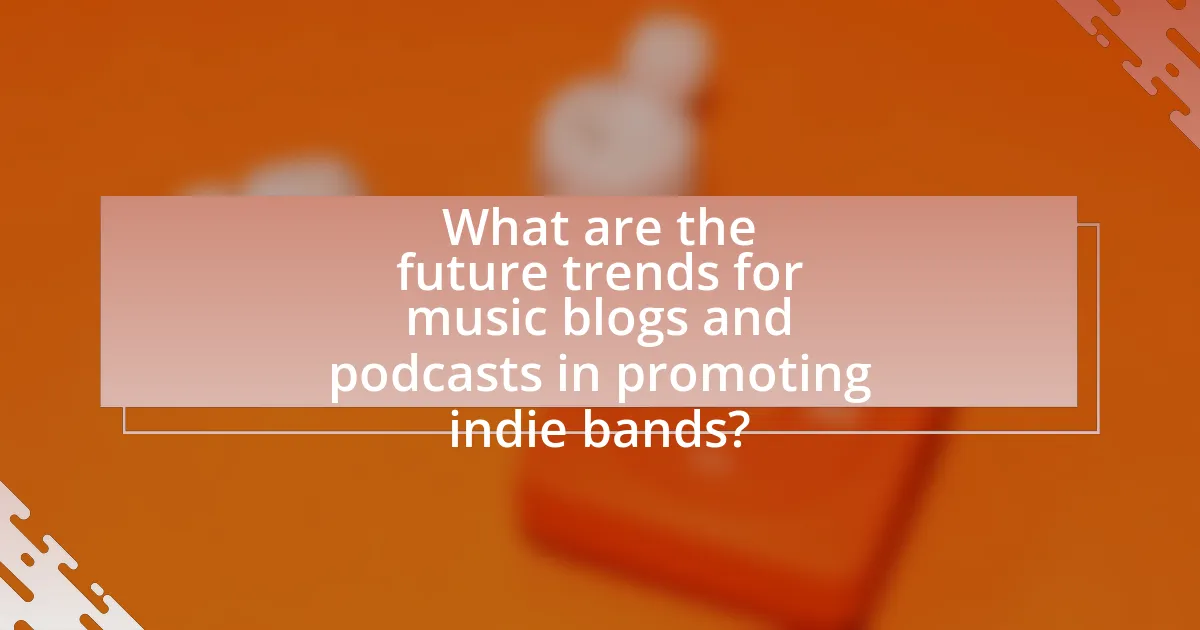
What are the future trends for music blogs and podcasts in promoting indie bands?
Music blogs and podcasts will increasingly focus on personalized content and community engagement to promote indie bands. As algorithms improve, platforms will tailor recommendations based on listener preferences, enhancing discoverability for indie artists. Additionally, the rise of interactive formats, such as live podcasts and Q&A sessions, will foster direct connections between fans and musicians, creating a more immersive experience. Data from the 2022 Infinite Dial report indicates that 57% of Americans aged 12 and older listen to podcasts, highlighting the growing audience for this medium. This trend suggests that music blogs and podcasts will play a crucial role in shaping the future landscape for indie band promotion.
How is technology changing the landscape of music blogs and podcasts?
Technology is transforming music blogs and podcasts by enhancing accessibility, interactivity, and content distribution. Digital platforms enable creators to reach global audiences instantly, allowing indie bands to gain exposure without traditional gatekeepers. For instance, the rise of social media and streaming services has facilitated direct engagement between artists and fans, fostering community and support. According to a 2021 report by the International Federation of the Phonographic Industry, 70% of music listeners discover new artists through online platforms, underscoring the significant impact of technology on music promotion. Additionally, advancements in audio production tools have democratized content creation, enabling more individuals to produce high-quality podcasts and blogs, further diversifying the music landscape.
What role do social media platforms play in the promotion of indie bands through blogs and podcasts?
Social media platforms are crucial in promoting indie bands through blogs and podcasts by facilitating direct engagement and content sharing. These platforms enable indie bands to reach wider audiences, as they can share links to their music, blog features, and podcast appearances, amplifying their visibility. For instance, a study by the Pew Research Center indicates that 72% of adults use social media, providing a vast potential audience for indie music promotion. Additionally, blogs and podcasts often leverage social media to distribute their content, allowing indie bands to benefit from the established follower bases of these platforms. This interconnectedness enhances the discoverability of indie music, leading to increased fan engagement and support.
How are emerging platforms influencing the way indie bands are promoted?
Emerging platforms are significantly transforming the promotion strategies of indie bands by providing direct access to audiences and enabling targeted marketing. These platforms, such as social media, music streaming services, and podcasts, allow indie bands to share their music and engage with fans without relying on traditional record labels. For instance, platforms like Bandcamp and SoundCloud enable artists to distribute their music directly to listeners, while social media channels like Instagram and TikTok facilitate viral marketing through user-generated content. According to a 2021 report by MIDiA Research, 60% of independent artists reported that social media was their primary tool for promotion, highlighting the shift towards digital engagement. This direct interaction fosters a community around indie music, allowing bands to build a loyal fanbase and gain visibility in a crowded market.
What can indie bands do to stay relevant in the evolving music blog and podcast scene?
Indie bands can stay relevant in the evolving music blog and podcast scene by actively engaging with their audience through social media, collaborating with influencers, and consistently releasing high-quality content. Engaging with fans on platforms like Instagram and TikTok allows bands to build a loyal following and create buzz around their music. Collaborating with music bloggers and podcasters can increase their visibility, as these platforms often seek fresh content and unique stories to share. Additionally, releasing new music, behind-the-scenes content, and live performances keeps the audience interested and invested in the band’s journey. According to a 2021 study by the Music Industry Research Association, 70% of music discovery now occurs through social media and streaming platforms, highlighting the importance of these strategies for indie bands to remain relevant.
What innovative marketing strategies can indie bands adopt to enhance their presence in music blogs and podcasts?
Indie bands can enhance their presence in music blogs and podcasts by leveraging targeted social media campaigns, engaging directly with influencers, and creating unique content that resonates with niche audiences. Targeted social media campaigns allow bands to reach specific demographics, increasing the likelihood of being featured in relevant blogs and podcasts. Engaging directly with influencers, such as music bloggers and podcasters, through personalized outreach can lead to collaborations or features, as these individuals often seek fresh content. Additionally, creating unique content, such as behind-the-scenes videos, exclusive interviews, or interactive live sessions, can capture the interest of both bloggers and podcasters, making them more likely to share the band’s story with their audiences. These strategies are supported by the growing trend of personalized marketing in the music industry, where direct engagement and unique storytelling have proven effective in increasing visibility and audience connection.
How can indie bands measure the effectiveness of their promotional efforts through blogs and podcasts?
Indie bands can measure the effectiveness of their promotional efforts through blogs and podcasts by analyzing metrics such as website traffic, social media engagement, and listener feedback. For instance, tracking the number of visits to their website after a blog feature or podcast interview can indicate the reach and impact of that promotional effort. Additionally, monitoring social media interactions, such as likes, shares, and comments related to the blog or podcast content, provides insight into audience engagement and interest. Listener feedback, including comments and reviews on podcast platforms, can also serve as qualitative data to assess how well the promotional content resonates with the audience. These metrics collectively help indie bands evaluate the success of their promotional strategies in driving awareness and engagement.
What practical tips can indie bands follow to maximize their promotion through music blogs and podcasts?
Indie bands can maximize their promotion through music blogs and podcasts by actively engaging with the platforms and tailoring their outreach strategies. First, bands should research and identify blogs and podcasts that align with their genre and audience, ensuring their music fits the platform’s style. Next, they should create a compelling press kit that includes high-quality music samples, professional photos, and a well-crafted bio to capture the attention of bloggers and podcasters.
Additionally, bands should personalize their outreach emails, demonstrating genuine interest in the blog or podcast and explaining why their music would resonate with its audience. Following up politely after initial contact can also enhance visibility. Furthermore, participating in interviews or guest appearances on podcasts can provide direct access to new listeners, as evidenced by the growing trend of artists gaining significant followings through podcast features.
Lastly, maintaining an active online presence and sharing blog features or podcast episodes on social media can amplify reach and engagement, creating a cycle of promotion that benefits both the band and the platforms.
